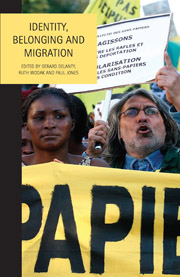Book contents
- Frontmatter
- Contents
- Acknowledgements
- List of Figures
- Notes on Contributors
- Introduction: Migration, Discrimination and Belonging in Europe
- I Theoretical Perspectives on Belonging
- II Institutional Forms of Discrimination
- 5 Racism, Anti-Racism and the Western State
- 6 What Space for Migrant Voices in European Anti-Racism?
- 7 Multiculturalization of Societies: The State and Human Rights Issues
- 8 Towards a Theory of Structural Discrimination: Cultural, Institutional and Interactional Mechanisms of the ‘European Dilemma’
- 9 On Institutional and Agentic Discrimination: Migrants and National Labour Markets
- 10 Non-Place Identity: Britain's Response to Migration in the Age of Supermodernity
- III Cases of Belonging and Exclusion
- Conclusion: Discrimination as a Modern European Legacy
- Index
6 - What Space for Migrant Voices in European Anti-Racism?
from II - Institutional Forms of Discrimination
- Frontmatter
- Contents
- Acknowledgements
- List of Figures
- Notes on Contributors
- Introduction: Migration, Discrimination and Belonging in Europe
- I Theoretical Perspectives on Belonging
- II Institutional Forms of Discrimination
- 5 Racism, Anti-Racism and the Western State
- 6 What Space for Migrant Voices in European Anti-Racism?
- 7 Multiculturalization of Societies: The State and Human Rights Issues
- 8 Towards a Theory of Structural Discrimination: Cultural, Institutional and Interactional Mechanisms of the ‘European Dilemma’
- 9 On Institutional and Agentic Discrimination: Migrants and National Labour Markets
- 10 Non-Place Identity: Britain's Response to Migration in the Age of Supermodernity
- III Cases of Belonging and Exclusion
- Conclusion: Discrimination as a Modern European Legacy
- Index
Summary
The European Union (EU) positions itself as a rights-based union founded on the principles of liberty, democracy, respect for human rights and fundamental freedoms and the rule of law. It included anti-racism into its fields of competence a little before the end of the millennium and has, over the past decade, developed a set of tools and mechanisms to address issues related to racism and xenophobia on a European platform. As highlighted by Alana Lentin, anti-racism ought to be considered as a subject of study that bears political significance in itself, and involves more than a simple ‘commonsensical’ opposition to racism (Lentin 2004). As such, the discourse, activities and policies of the EU in the field of anti-racism need to be considered in light of their underlying assumptions and contradictions, and beyond the proclaimed European rejection of all behaviour and structures that perpetrate or encourage the development or persistence of racism and xenophobia in Europe. This chapter proposes to trace the position of antiracism in a broader EU policy context through a brief historiography of the development of race matters in the EU. It critically assesses the policy priorities and the theoretical frameworks of European anti-racist activities. EU anti-racist policies will undoubtedly bear a growing influence on the experiences of those affected by racism in Europe as they are in constant interaction with member states’ policies in the field of anti-racism and create new spaces for anti-racist action.
- Type
- Chapter
- Information
- Identity, Belonging and Migration , pp. 120 - 133Publisher: Liverpool University PressPrint publication year: 2011
- 1
- Cited by



